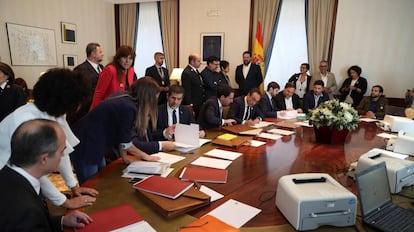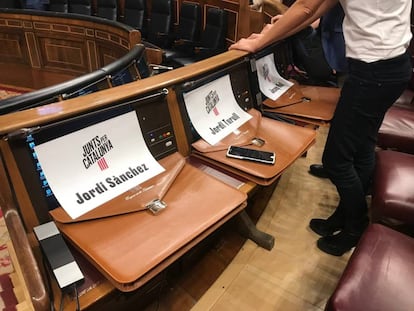Spanish Congress to suspend jailed Catalan deputies from their seats
The new parliament is convening today, and will likely follow regulatory guidelines against the pro-independence leaders caught up in criminal proceedings

When Spain’s new Congress of Deputies convenes on Tuesday following the general election of April 28, its first key decision will likely be to suspend four Catalan lawmakers who are currently in preventive prison and on trial for the failed secession attempt of 2017, according to legal and parliamentary sources.
Parliamentary regulations and criminal legislation establish such a measure for deputies who are caught up in court proceedings, until a verdict is handed down.
What happens to the four seats that will presumably be left vacant is a key issue for the formation of a new government
Besides the newly elected deputies Oriol Junqueras, Josep Rull, Jordi Turull, and Jordi Sànchez, the senator-elect Raül Romeva is also being tried at the Supreme Court for rebellion, sedition and misuse of public funds in connection with the illegal breakaway bid. All five were members of Carles Puigdemont’s Cabinet when the latter organized an unauthorized independence referendum in October 2017, followed by a unilateral independence declaration passed by the Catalan parliament.
All five were briefly transferred from jail to parliament on Monday to fill out the paperwork necessary to be sworn in on Tuesday, when all new deputies and senators will be asked to swear allegiance to the Spanish Constitution.

Spain’s lower and upper houses are convening at 10am for their inaugural sessions following a snap election that was won by the Socialist Party (PSOE), although acting Prime Minister Pedro Sánchez fell short of a majority and now needs support from other parties to get himself back into La Moncloa, the seat of government.
In a move widely seen as an overture to Barcelona, Sánchez has nominated two Catalans to be the speakers of both Congress and the Senate. However, his first choice for Senate speaker, Miquel Iceta, was voted down by separatist parties inside the Catalan parliament last week in an unprecedented move that suggests skepticism about the acting PM’s offer of renewed negotiations to resolve the territorial crisis.
The suspension of the jailed Catalan deputies on trial will not be automatic. Instead, the lower house’s legal counsel will first need to issue a report based on the Supreme Court’s guidelines. A few hours after the new legislators are sworn in, the speaker’s committee will meet, presided by newly appointed speaker Meritxell Batet of the PSOE. Parliamentary sources said they expect this governing body of Congress to start dealing with the suspension procedure straight away.
Vox is calling the presence of the five deputies “a failure of democracy and of the rule of law”
What happens to the four seats that will presumably be left vacant is a key issue for the formation of a new government. If the four Catalan deputies are suspended but refuse to hand over their position to a fellow party member, the number of voting deputies will go down from 350 to 346, making it easier for Sánchez, who has 123 seats, to reach the overall majority he will need at the investiture vote. But Socialist sources were skeptical that the Catalan Republican Left (ERC) and Together for Catalonia (JxC) parties would make such a move.
Parliamentary sources also admitted that there is a sense of unhappiness about the fact that the Supreme Court passed on the final decision on suspension to Congress, rather than making that call itself.
Opposition angry
Meanwhile, opposition parties are upset about the fact that secessionist politicians are being allowed to become members of Spanish parliament at all. The Popular Party (PP) said it constitutes an offense. “Now more than ever, it is necessary to defend our Constitution, democracy and freedoms,” said PP leader Pablo Casado.
“We believe that individuals who face criminal proceedings, who tried to stage a coup and liquidate national sovereignty, cannot sit in parliament and earn a public salary,” added Ciudadanos (Citizens) chief Albert Rivera.
And the far-right Vox, which will enter Congress for the first time with 24 lawmakers, called the separatist deputies’ presence “a failure of democracy and of the rule of law.” Vox deputy-elect Macarena Olona blamed other parties for allowing five “criminals” to try to “break up the state from within the institutions.”
English version by Susana Urra.
Tu suscripción se está usando en otro dispositivo
¿Quieres añadir otro usuario a tu suscripción?
Si continúas leyendo en este dispositivo, no se podrá leer en el otro.
FlechaTu suscripción se está usando en otro dispositivo y solo puedes acceder a EL PAÍS desde un dispositivo a la vez.
Si quieres compartir tu cuenta, cambia tu suscripción a la modalidad Premium, así podrás añadir otro usuario. Cada uno accederá con su propia cuenta de email, lo que os permitirá personalizar vuestra experiencia en EL PAÍS.
¿Tienes una suscripción de empresa? Accede aquí para contratar más cuentas.
En el caso de no saber quién está usando tu cuenta, te recomendamos cambiar tu contraseña aquí.
Si decides continuar compartiendo tu cuenta, este mensaje se mostrará en tu dispositivo y en el de la otra persona que está usando tu cuenta de forma indefinida, afectando a tu experiencia de lectura. Puedes consultar aquí los términos y condiciones de la suscripción digital.








































